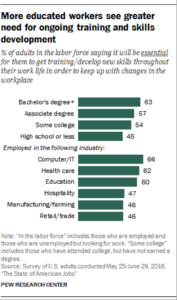
This ninety-five-page report – The State of American Jobs – from the Pew Research Center touches on a lot of valuable data for the ATE community related to the changing economic landscape, workers’ ideas about their own commitment to retraining and honing their skillset(s), and how workers view the role of higher education as part of this process.
The report begins by examining Changes in the American workplace, helping to pick apart the socio-economic factors at the core of this evolution. A significant focus of this section is the shift in job opportunities away from those that need manual or physical skillsets and towards those that require high levels of social or analytical skills. Not surprisingly, employment opportunities are much higher for those with more experience and job preparation (whether from education, training, or gleaned through what my grandmother Hazel always referred to as the school of hard knocks – i.e. life experience.)
The second section of the report explores How Americans assess the job situation today and prospects for the future and the third focuses on How Americans view their jobs. Again, there is a variety of interesting data as well as analysis and conclusions in these two sections. For example, most Americans feel that while there still aren’t enough good local employment opportunities, the situation seems better to them than during the worst of the Great Recession. Another takeaway – most feel that their standard of living is as good or maybe even better than their parents and they feel optimistic about the next generation’s chances of doing the same. Turning to how American’s feel about their jobs – most seem to feel their jobs are secure, highly educated workers are among those most happy in their job situations, and Americans are divided on the issue of living to work or working to live (whether jobs provide a sense of identity or just provide a living).
The final two sections are related to Skills and training needed to compete in today’s economy and The value of a college education. These sections should prove especially useful to ATE community members, offering some compelling findings:
- Half of those workers surveyed responded that interpersonal skills are critically important to their job.
- About a third feel they don’t have the education or training they need to get ahead in their workplace.
- Americans as a whole feel that the purpose of college should be more about workforce-relevant skills and knowledge acquisition and less about personal or intellectual growth – however, the more education respondents had the more inclined they were to disagree with this finding.
- Of those who went to college (both two and four-year institutions) 62% felt that the college experience helped them grow – both personally and intellectually. 53% felt that college helped open doors for them in finding a job and 49% felt that their education provided them with skills and specific knowledge that would prove useful in the workplace.
There are a lot of reasons to dig into this latest report from Pew – it’s chock full of tables, data, and analysis provided in an easy to digest format. Readers will understand more about how workers view their needs for ongoing training, what sectors have had the most rapid employment growth, and what knowledge and skills Americans believe are most critical for their own long-term success in the marketplace. While I suspect that some of the findings will be part and parcel of the day-to-day experience of those in the ATE community, many are noteworthy and much of this data will surely be useful for presentations, research, grant writing and reporting, as well as in the classroom. Grab a cup of tea, curl up on the couch, and dive in – you won’t be disappointed.

 Subscribe
Subscribe


 See More ATE Impacts
See More ATE Impacts

Comments
There are no comments yet for this entry. Please Log In to post one.